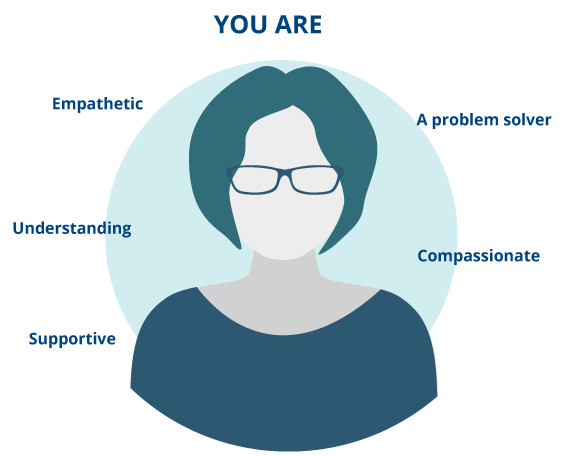Counseling Degrees, Careers,
Salaries & More
Sometimes, having an objective listener can make all the difference. That’s what counselors do—listen to the concerns of their patients, identify individual needs, and develop treatment plans.
Professionals in the field might work as licensed mental health counselors, marriage and family therapists, substance abuse counselors, and much more. These specialists use time-tested and research-based techniques to help their clients overcome some of life’s most difficult challenges.
Contents
What Counselors Do
As a counselor, what you do depends on your exact role and area of expertise. The goal of all counselors, however, is the same: to help patients address and ultimately overcome their struggles, thereby improving overall well-being and satisfaction in life. You may help clients with a range of issues such as depression and anxiety, grief and loss counseling, PTSD, substance abuse, behavioral disorders, physical disabilities, relationship problems, career and educational concerns, or other life events.
Psychologist vs. counselor
There’s a good amount of overlap between the job duties of counselors and psychologists, but there are also some key differences. As a counselor, you typically only need a master’s degree, which allows you to provide much of the same assessment and treatment as a clinical and counseling psychologist.
Psychologists, on the other hand, usually need to hold a doctoral degree, which is required by most U.S. states for licensing. Licensing grants these professionals the ability to work independently with patients, conduct new research, and/or teach at the graduate level.
Neither of these roles should be confused with a psychiatrist, who is a medical doctor and is the only role of the 3 that are legally allowed to prescribe medication.
Careers in Counseling
A number of factors influence whether a counselor should work in private practice or for an institution. If you’re new to the field and lack a large patient base, you’ll have to work hard at marketing yourself and getting referrals—a process that will happen throughout your career. Working at an institution may help you gain valuable knowledge from colleagues and receive employer-paid benefits. However, this path doesn’t offer the same schedule flexibility as a private practice.
That said, counselors can work with many different types of patient populations and in a wide variety of settings. Roles within the field include but aren’t limited to the following positions.
Marriage and family therapists
Licensed marriage and family therapists, or LMFTs, focus specifically on the dynamics of couples and the family. They can address a wide range of issues that affect life both in and out of the home, including developmental disorders, behavioral issues, marital problems, domestic violence, infertility, substance abuse, and much more. You can most often find them in mental health clinics and private practice.
Mental health counselors
These counselors are often the first that people seek out when they need professional mental and emotional support. Working more broadly than other types of counselors, they provide guidance to both individuals and groups on issues like depression, trauma, personality disorders, stress management, career satisfaction, relationship issues, self-image, and just about any other problem that can impact the state of your mental health. These roles can work in any setting where mental health services are offered.
Pastoral counselors
Pastoral counseling brings the science of psychology into religious organizations or faith-based roles in other institutions. These counselors provide emotional and spiritual support to everyone from the very young to the very old. They might work with people who are questioning their faith, who are struggling with death or disease, who are seeking premarital services, or who want religious guidance for their families, among many other things. They can work within a church but are also found in mental health centers, private practices, treatment programs, correctional facilities, and more.
Recreational therapists
Recreational therapists work with patients who have been injured and help them become healthy and active again. Using a wide variety of methods, these therapists not only work to address physical conditions but any mental or emotional issues their patients may have because of their injury. Common methods for treatment include arts and crafts, animal therapy, games, sports, music, drama, and dance. Recreational therapists work largely in nursing care facilities but are also employed by hospitals, rehab centers, special education programs, government agencies, community centers, among others.
Rehabilitation counselors
Rehabilitation counselors can be similar to recreational therapists, and may include speech therapists, though their focus is more on people with long-term physical, mental, and emotional disabilities, and their treatment methods are more traditional than creative. They work to help their patients live as independently as possible, teaching them techniques for managing physical, social, occupational, and other limitations. Common workplace settings include residential and nursing care facilities, as well as schools, state departments, and community centers.
School counselors
School counselors work with students at all levels, from kindergarten through college. They address a number of issues that can affect the quality of education a student receives, including concerns like learning disabilities, bullying, low self-esteem, substance abuse problems, and issues at home. Those working within secondary and postsecondary institutions frequently provide resources to help students make decisions about advancing their education. In especially challenging situations or for particularly at-risk students, a school counselor might refer a student to a school psychologist.
Substance abuse counselors
Substance abuse counselors diagnose and assess addition, developing treatment plans to help their patients get on the path toward recovery. In this role, you’ll frequently work with clients who are struggling with alcoholism and drug addiction, though other destructive behaviors like eating disorders and gambling are also common. Sessions include discussing methods for coping, as well as techniques for repairing any personal or professional relationships that may have been affected. Substance abuse counselors work in hospitals, private practices, mental health centers, government agencies, and more.
Counselor Salary & Job Growth
Counseling salaries vary widely depending on the exact role you hold, where you live, and the setting in which you work. That said, the U.S. Bureau of Labor Statistics 2023 Occupational Outlook Handbook lists the median salary for counselors to be $46,130 per year. Median annual salaries for other counseling roles are as follows.

$61,710
Education, Guidance & Career Counselors

$53,710
Substance Abuse & Mental Health Counselors

$44,040
Rehabilitation Counselors

$46,130
Other Counselors
Through 2031, job opportunities for mental health, substance abuse, and behavioral disorder counselors are projected to grow by 18.4%, a rate that’s four times that of the national average for all occupations. School and career counselors are expected to see an also-faster-than-average growth of 5.4%.
Job Growth
18.4%
Skills You Need

As a counselor, you may work with everyone from children to married couples or the elderly, and in as many different environments as there are types of people. But what personality traits and skills will you need to be an effective counselor?
- Strong interpersonal skills
- Strong verbal skills
- Goal-setting skills
- Clear boundaries
- High ethical standards
How to Become a Counselor
Being a counselor involves several steps—evaluating your goals, earning your degree, and gaining your state-issued license.
1
Evaluate your skills
To be a successful counselor, you need to possess certain abilities personality traits. These include:
- Strong communication skills
- The ability to assess emotion and behavior
- Empathy for others
- A lack of judgement
- High ethical standards
- A calm and supportive attitude
- The desire to work with many different types of people
2
Research careers and educational tracks
To become a licensed counselor or therapist, most states require you to hold a master’s degree, though some only require a bachelor’s. The exact program and degree type you choose will depend on these criteria as well as your individual goals. In order to gain licensure, most states require counselors to hold a master’s degree, complete between 2,000 to 4,000 hours of supervised clinical experience and pass an exam. Check with your state’s licensing board to understand the requirements you need to meet.
3
Earn a counseling or therapy degree
Becoming a counselor typically starts by earning a bachelor’s degree in counseling, therapy, or a closely related field such as psychology, human services, or social work. In most cases, you’ll need to go on to earn your master’s. When researching programs, be sure the one that you choose is accredited. Depending on your program, accreditation will likely be through either the Council for Accreditation of Counseling & Related Educational Programs or the Commission on Accreditation for Marriage and Family Therapy Education.
4
Become a licensed counselor or therapist
Once you hold you hold the degree you need, most states require additional experience before you can earn your license. This typically involves around 2 years of supervised work under a licensed counselor or therapist.
After completing all your supervised hours, you can then sit for the appropriate exam based on your career goals and state requirements. Some states have their own exams while others use national exams. In the case of the latter, you’ll either take 1 of 2 tests administered by the National Board of Certified Counselors or the exam given by the Association of Martial & Family Therapy Regulatory Boards. Some states may also require you to pass a jurisprudence exam specific to the laws of the state before you can apply for your license.
5
Find a counseling job
Joining a professional organization is not only a great way to stay up to date on the latest information in the field, but it can also help you learn about job opportunities and find resources that can help you land a position. The American Counseling Association is the world’s largest organization representing professional counselors and offers a career center with job postings in a wide variety of settings, as well as tips for resume building, interviewing, and finding internships.
Counseling Degree Types
Degrees in counseling and therapy can be found at all levels, but again, in most cases, a master’s degree is needed to become licensed.
Associate’s degree in counseling
An associate’s degree with a concentration in counseling or a closely related field can be your entryway to higher education. With this degree, you can complete your first two years of college at a lower cost before transferring into a bachelor’s program.
Bachelor’s degree in counseling
In some cases, a bachelor’s in counseling may be all that you need to earn your state license, though more often, it’s another step toward earning an advanced degree. Unless you hold a previous associate’s degree, these typically take 4 years to complete. With this degree, you might be able to practice as a counselor or in another role like a human resources specialist, community service manager, or rehabilitation assistant.
Master’s degree in counseling
This is the level at which most states view eligibility for licensing as a counselor or therapist. With a master’s degree, you can gain a general counseling education or tailor your degree further into areas such as rehabilitation, substance abuse, marriage and family, educational and vocational, conflict resolution, and more. These programs typically take between 1 1/2 and 2 years following completion of your bachelor’s. For admission, you’ll likely need to get good scores on the GRE and have a previous GPA of 3.0 or higher.
Doctoral degree in counseling
It’s normally not necessary for counselors or therapists to seek doctoral-level education, however if you want to become a licensed counseling psychologist, this is the degree for you. Most often, you’ll choose between a PhD or PsyD degree. The former typically takes between 5 and 8 years to complete and puts an emphasis on teaching and research. The latter usually takes between 4 and 6 years, with a greater focus on the practical application of knowledge through hands-on work with clients.
Continuing education after earning your degree
Counselors in all sub-specialties are required to complete continuing education courses in order to renew their license. For example, school counselors in most states must renew their license every five years. In that time, they must complete a set amount of continuing education courses.
Online & Accelerated Options
There are many programs that offer online counseling degrees, however, keep in mind that both master’s and doctoral programs require you to complete supervised experiences such as practicums and internships. So, while you may be able to complete the majority of your coursework online, these will need to be done in person. Accelerated options are also an option for people who want to earn their degree more quickly. These programs differ depending on the school, but often involve applying credits from previous education or work experience, passing tests that waive the need for a certain course, or taking intensives that allow you to earn your credits in a shorter period of time.
Is Financial Aid Available?
There are several different types of financial aid available for students seeking degrees in counseling and therapy. The first step is to fill out the Free Application for Federal Student Aid (FAFSA). This form allows the government to determine how much assistance you’re eligible to receive in the form of loans, grants, and work-study stipends. You can also apply for loans through banks and other private institutions. You might also qualify for scholarships based on academic achievements or other criteria. Scholarships can be awarded by your school or outside organizations. If you’re pursuing a master’s or doctoral degree, fellowships can also be a great way to fund your education. These financial awards are given to full-time students and may be on a short- or long-term basis. If you wish to pursue a doctorate in counseling psychology or another subfield of psych, many schools offer tuition remission for research or teaching assistantships. Tuition can be fully or partially waived beginning as soon as your first year, and remission might also come with additional stipends and benefits.
Are counselors eligible for student loan forgiveness?
Through the Public Service Loan Forgiveness Program, you can relieve a portion of your debt if you meet certain criteria. These include:
- Having direct loans
- Having made at least 120 qualifying payments
- Working full-time for at least 10 years in the public sector
Those working specifically as school counselors can receive up to a $5,000 in forgiveness on Stafford Loans if they’ve worked for least 5 consecutive years in a low-income school.
Professional Organizations for Counselors
Becoming a member of a professional organization can be highly beneficial to your career. Membership can be a great way to meet other professionals in the field, gain specialty certification, subscribe to publications, attend conferences and events, and find opportunities for jobs and continuing education. Some national organizations to know include:
- The American Counseling Association (ACA)
- National Association for Alcoholism and Drug Abuse Counselors (NAADAC)
- American Association for Marriage and Family Therapy (AAMFT)
- American Family Therapy Academy (AFTA)
- The American Academy of Grief Counseling (AAGC)
- The American School Counselor Association (ASCA)
- The American College Counseling Association (ACCA)
Within the ACA, you can also join 1 or more of 19 divisions that provide resources for specialized areas and interests within counseling. These include topics such as addiction, adult development, counselor education, LGBTQ issues, marriage and family, multicultural counseling, rehabilitation, and more.
